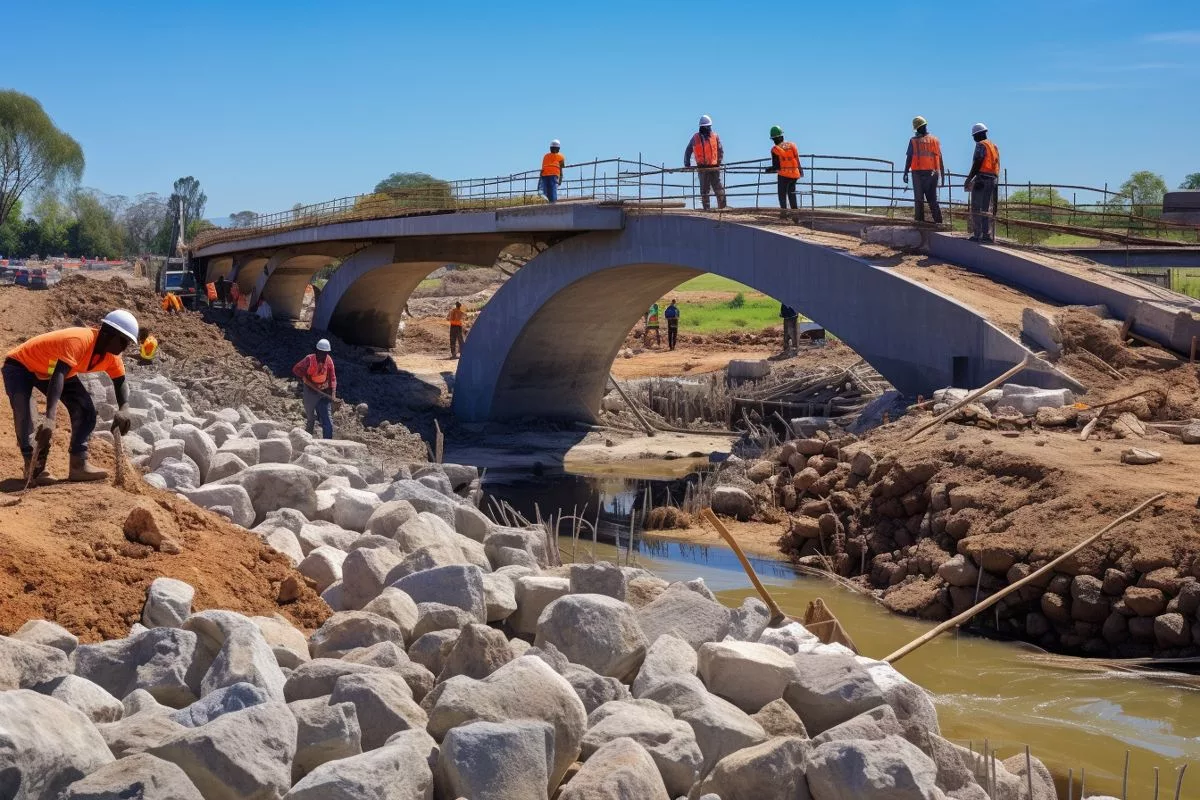The Welisizwe Bridges Project, a collaboration between the Department of Public Works and Infrastructure, the South African National Defence Force (SANDF), and the Provincial Departments of Transport, is an ambitious three-year initiative with a R3.3 billion budget allocation to build 134 bridges across six provinces in rural South Africa. The project not only provides access to essential services but also creates numerous employment opportunities through the Expanded Public Works Programme, offering valuable skills to the workforce. The initiative symbolizes the government’s dedication to addressing inequality and improving the wellbeing of its citizens, serving as a blueprint for similar programs in other countries.
What is the Welisizwe Bridges Project in South Africa?
The Welisizwe Bridges Project is a three-year initiative aiming to build 134 bridges across six provinces in South Africa’s remote regions. It is a collaboration between the Department of Public Works and Infrastructure, the South African National Defence Force (SANDF), and the Provincial Departments of Transport. The project not only provides access to essential services but also creates numerous employment opportunities through the Expanded Public Works Programme.
A Promising Initiative for Rural South Africa
In the midst of rapid technological progress and urban development, it is not uncommon for the vital role of fundamental infrastructure, especially in rural areas, to be overlooked. For numerous communities, the lack of a simple bridge can result in significant consequences, such as limited access to essential services and life-threatening hazards during the rainy seasons. South Africa’s Public Works and Infrastructure Minister Sihle Zikalala has recently launched a bold program to address the backlog of bridge infrastructure in the country’s remote regions.
The Welisizwe Bridges Project is a three-year initiative with a substantial R3.3 billion budget allocation, aiming to build 134 bridges across six provinces. This impressive effort is a collaboration between the Department of Public Works and Infrastructure, the South African National Defence Force (SANDF), and the Provincial Departments of Transport. By focusing on rural regions where bridge construction is behind schedule and where the lack of such infrastructure poses significant risks to residents during the rainy season, the Welisizwe Bridges Project hopes to greatly enhance the lives of the impacted communities.
More Than Just Bridges: A Holistic Approach to Problem Solving
What makes this initiative especially remarkable is not only its ambitious scope but also its dual emphasis on practical and social benefits. In addition to providing access to essential services such as healthcare, education, and economic opportunities, the Welisizwe Bridges are designed to create numerous employment opportunities through the Expanded Public Works Programme (EPWP). Each bridge site employs 7 SANDF members, five artisans, and 40 EPWP workers, offering valuable skills like welding, groundwork, and soil retention to the workforce.
The pilot phase of the Welisizwe Bridges program has already started in the Eastern Cape, with an annual allocation of R1.1 billion for the region. Minister Zikalala, Eastern Cape Transport MEC Xolile Nqatha, and Port St Johns local Municipality Mayor Nomvuzo Mlombile-Cingo recently visited two construction sites in Port St Johns, where the Sunrise and Ntlenga bridges are already 50% complete. Upon completion, these bridges promise a safer rainy season for the local communities, who have long struggled with dangerous river crossings during periods of flooding.
The Lasting Impact of the Welisizwe Bridges Project
The importance of the Welisizwe Bridges Project goes beyond its immediate goals, as it symbolizes the government’s dedication to addressing inequality and improving the wellbeing of its citizens. By recognizing the challenges faced by marginalized communities and investing in long-term solutions, this initiative has the potential to serve as a blueprint for similar programs in other countries.
As the Welisizwe Bridges emerge, connecting lives and spanning rivers, they demonstrate the transformative power of infrastructure in not only bridging physical gaps but also social divides. The program’s innovative approach to addressing practical needs while fostering employment and skills development stands as a testament to the importance of holistic problem-solving in the realm of public policy.
Throughout history, bridges have often been celebrated as symbols of progress, ingenuity, and human connection. From ancient Roman aqueducts to the modern marvels of engineering that dot our contemporary landscape, these structures have long facilitated the exchange of ideas, goods, and cultures. In this sense, the Welisizwe Bridges Project aligns itself with a grand tradition of civilizational advancement, capturing the spirit of human endeavor and resilience.
As construction progresses on the Welisizwe Bridges, it is worth contemplating the broader implications of this project. What does it mean for a society to invest in the welfare of its most vulnerable members, to prioritize the provision of essential services, and to build bridges – both literal and metaphorical – between disparate communities? In an increasingly interconnected and globalized world, initiatives like the Welisizwe Project remind us of the enduring importance of local action and the power of tangible, on-the-ground solutions to create lasting change.
We eagerly await the completion of the Welisizwe Bridges and the multitude of positive outcomes they are expected to bring. In a time of uncertainty and upheaval, they stand as beacons of hope, symbols of progress, and monuments to the enduring strength of the human spirit.
1. What is the goal of the Welisizwe Bridges Project?
The goal of the Welisizwe Bridges Project is to build 134 bridges across six provinces in rural South Africa to provide access to essential services and enhance the lives of impacted communities.
2. Who is collaborating to make the Welisizwe Bridges Project possible?
The Welisizwe Bridges Project is a collaboration between the Department of Public Works and Infrastructure, the South African National Defence Force (SANDF), and the Provincial Departments of Transport.
3. How much budget has been allocated for the Welisizwe Bridges Project?
The Welisizwe Bridges Project has a substantial R3.3 billion budget allocation for a period of three years.
4. What is the Expanded Public Works Programme, and how is it involved in the Welisizwe Bridges Project?
The Expanded Public Works Programme (EPWP) is providing employment opportunities through the construction of the Welisizwe Bridges. Each bridge site employs 7 SANDF members, 5 artisans, and 40 EPWP workers, offering valuable skills like welding, groundwork, and soil retention to the workforce.
5. In which regions has the pilot phase of the Welisizwe Bridges Project started?
The pilot phase of the Welisizwe Bridges program has started in the Eastern Cape, with an annual allocation of R1.1 billion for the region.
6. How far along is the construction progress of the Sunrise and Ntlenga bridges in Port St. Johns?
The Sunrise and Ntlenga bridges in Port St. Johns are already 50% complete.
7. What is the broader impact of the Welisizwe Bridges Project?
The Welisizwe Bridges Project symbolizes the government’s dedication to addressing inequality and improving the wellbeing of its citizens, serving as a blueprint for similar programs in other countries. It demonstrates the transformative power of infrastructure in not only bridging physical gaps but also social divides.
8. What does the Welisizwe Bridges Project mean for society?
The Welisizwe Bridges Project means investing in the welfare of vulnerable members of society, prioritizing the provision of essential services, and building bridges – both literal and metaphorical – between disparate communities. It reminds us of the enduring importance of local action and the power of tangible, on-the-ground solutions to create lasting change.








